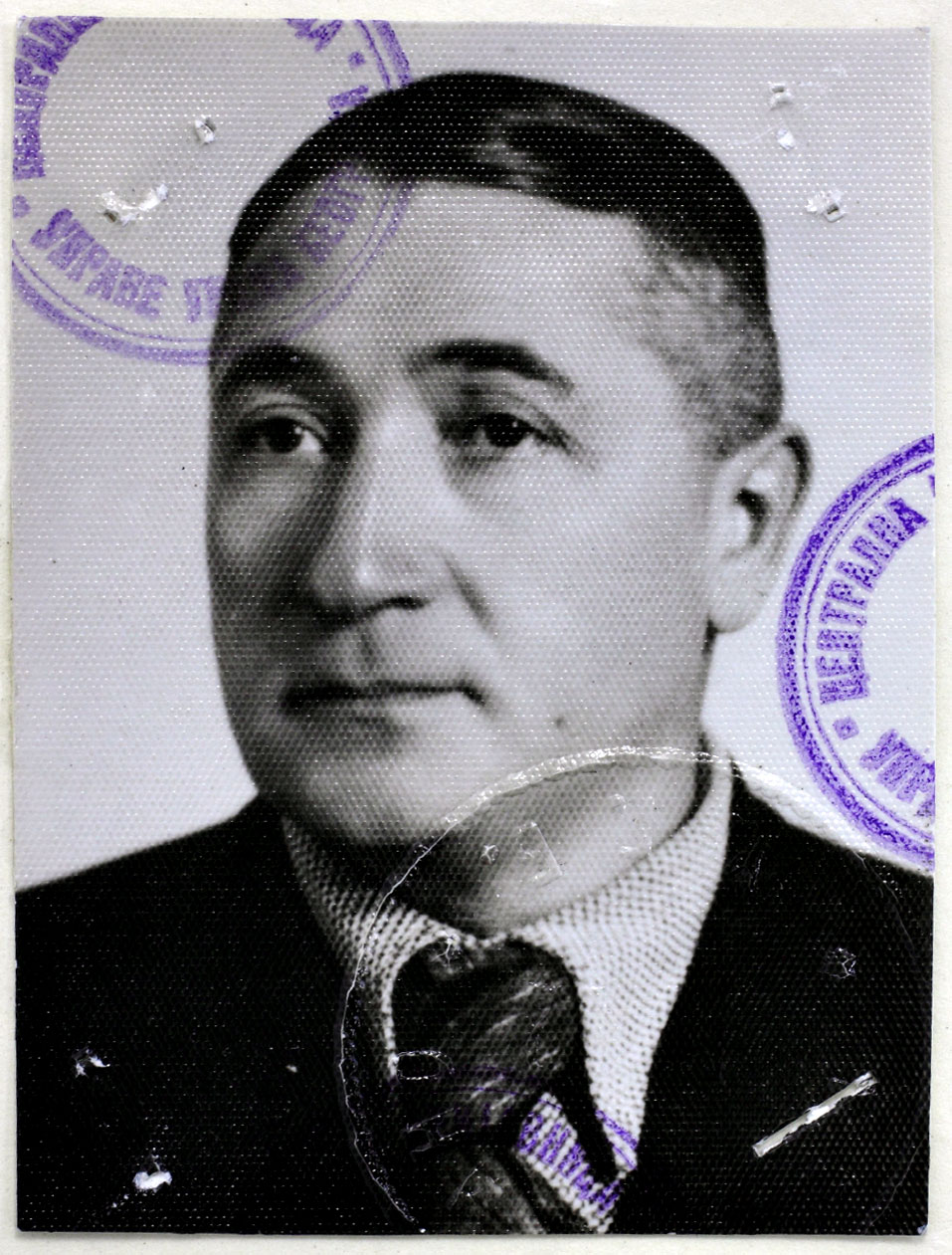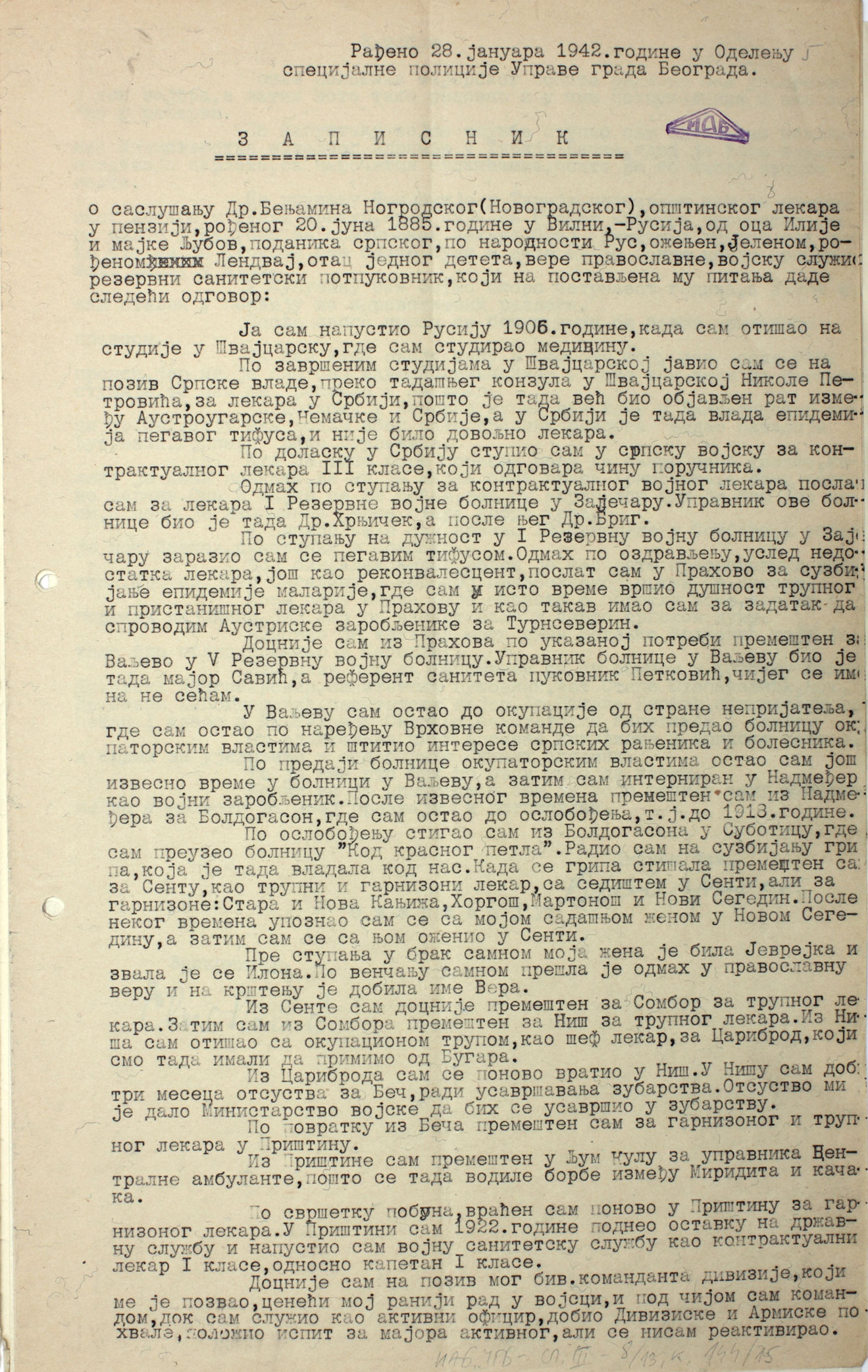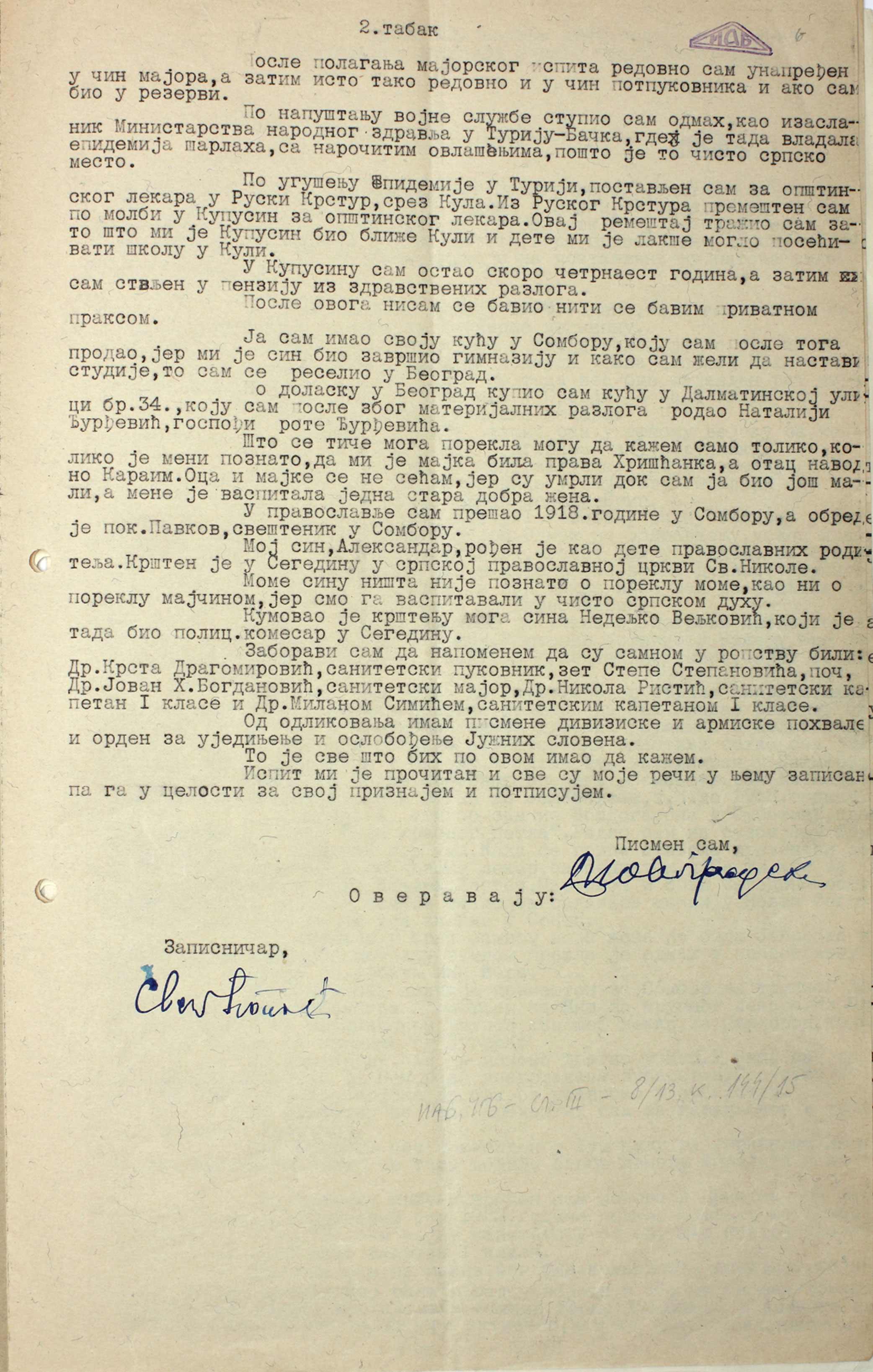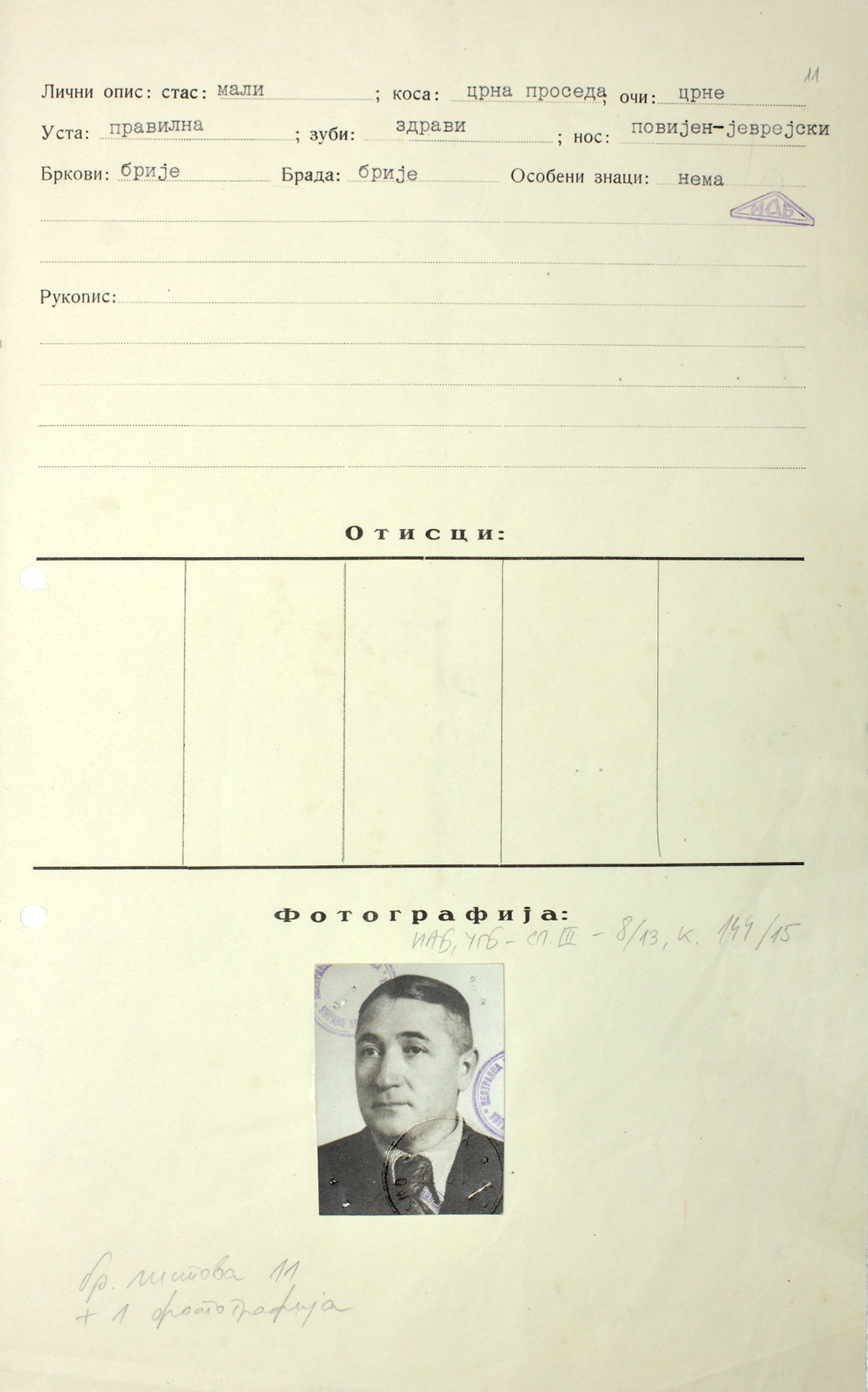Transcript of the record on the interrogation of Dr. Benjamin Novgorodski
Conducted on January 28, 1942, in the Department
Special Police of the Belgrade City Administration.
A R E C O R D
about hearing Dr. Benjamin Nogrodsky, a retired municipal doctor born on June 20, 1885 in Vilnius, Russia, from father Ilia and mother Ljubov, a Serbian, nationality Russian, married to Jelena, born xxxxx Lendva, father of one child, the Orthodox faith, served as a reserve lieutenant-lieutenant-lieutenant colonel, who asked him the following answer:
I left Russia in 1906 when I went to study in Switzerland, where I studied medicine.
After completing my studies in Switzerland, I contacted the Serbian government, through the then consul in Switzerland, Nikola Petrovic, for a doctor in Serbia, since the war between the Austro-Hungarian, German and Serbian wars had already been announced, and in Serbia there was a typhus epidemic there were enough doctors.
Upon my arrival in Serbia, I entered the Serbian army for the contractual physician of the 3rd class, which corresponds to the rank of lieutenant.
Immediately after becoming a contractual military doctor, I was sent to the doctor 1 of the Reserve Military Hospital in Zajecar. The manager of this hospital was then Dr. Hrnjiček, and after his doctor. Brig.
After taking up duty at the 1 Reserve Military Hospital in Zajecar, I became infected with the typhus. Immediately after healing, due to the lack of a doctor, even as a reconvalist, I was sent to Prahovo to suppress the epidemic of malaria, where at the same time I performed the duty of a hull and port physician in Prahovo and as such I had the task. to conduct Austrian prisoners for Turnseverin.
I was sent from Prahov, according to the need, transferred to Valjevo at the Reserve Military Hospital. The manager of the hospital in Valjevo was then Major Savic, and the sanitary officer Colonel Petkovic, whose name I do not remember.
In Valjevo, I remained occupied by the enemy, where I remained under the order of the Supreme Command to hand over the hospital to the occupying authorities and to protect the interests of the Serbian wounded and sick.
After handing over the hospital to the occupying authorities, I stayed for a while in a hospital in Valjevo, and then I was intercepted to Nadmere as a prisoner of war. After a while, I was transferred from the Border Guard to the Boldagavon, where I remained until the liberation, i.e. until 1918.
After the liberation, I arrived from Boldogason in Subotica, where I took over the hospital "Kod krasnog xxxxx" I was working on the suppression of the flu, which then ruled with us. When the flu was subdued, I was transferred to Sent, as a caring and garrison physician with headquarters in Senti, but for the garrison: Stara and Nova Kanjiza, Horgos, Martonos, and Novi Segedin. After some time I met my current wife in Novi Sad, and then I married her in Senta.
Before marriage, my wife was a Jew with me-and she called Ilona. After her marriage, she immediately went to Orthodox faith and at the baptism she received the name Vera.
From Senta I was later transferred to Sombor for a hired physician. Then I moved from Sombor to Nis for a hired physician. From Nis, Sim left with an occupying hull, as chief physician, for Caribrod, which we then had to receive from Bulgaria.
From Caribrod, I returned to Nis again. In Nis, I received three months of absences for Vienna, to improve dentistry. The vaccination was given to me by the Ministry of the Army to improve myself in dentistry.
Upon my return from Vienna, I was transferred to a garrison and hired a physician in Pristina.
From Prishtina I was transferred to Ljum Kulu for the manager of the Central Clinic, as the fighting between Miriditis and the caps were then underway.
At the end of the rebellion, I was returned to Pristina for a garrison doctor. In Pristina in 1922, I resigned from the civil service and left the military medical service as a contractual doctor of the 1st class, that is, the 1st class captain.
I'm more familiar with my ex. the commander of the division who invited me, appreciating my previous work in the army, and under whose command I was assigned as an active officer, I received the Divisive and Armenian praise, passed the exam for the major active, but I did not reactivate.
Pg 2
After passing the Majorian exam, I was regularly promoted to the rank of major, and then also regularly and in the rank of lieutenant colonel, although I was in reserve.
After leaving the military service, I immediately came as an envoy of the Ministry of Public Health in Turija. In Backa was then a scarlatina epidemic, with a special authority, since it is a purely Serbian place.
After the suppression of the epidemic in Turija, I was appointed a municipal physician in the Russian Krstur, the district of Kula. I was transferred from the Russian Baptist; upon request in Kupusin for a municipal doctor. I sought this transfer because Kupusin was closer to Kula and my child could have been easier to visit the school in Kula.
I remained in Kupusin for almost fourteen years, and then I was retired for medical reasons.
After this, I did not deal with or practice private practice.
I had my own house in Sombor, which I later sold because my son finished high school and that I wanted to continue my studies, I moved to Belgrade.
Upon my arrival in Belgrade, I bought a house in Dalmatinska Street no.34, which I, after the material reasons, sold to Natalija Đurđević, Mrs. Prote Đurđević.
As far as my origin is concerned, I can only say so much to my knowledge that my mother was a true Christian, and my father was supposedly Kargim. I do not recall the father and mother, because they died while I was still a little, and I was educated by an old good woman.
I went to Orthodoxy in 1918 in Sombor, and the priest is Lat. Pavkov, a priest in Sombor.
My son, Alexander, was born as a child of Orthodox parents. He was baptized in Szeged in the Serbian Orthodox Church of Sv. Nicholas.
My son is not aware of my origin or the origin of my mother, because we educated him in a purely Serbian spirit.
He cumed on the baptism of my son Nedeljko Veljkovic, who was then a police officer. Commissioner in Szeged.
I forget to mention that they were with me in slavery: Dr. Krsta Dragomirović, medical colonel, step by Stepa Stepanović, po, Dr.Jovan H.Bogdanović, medical major, Dr. Nikola Ristic, Medical Captain I Class and Dr. Milan Simic, medical captain of the I class.
From the decorations I have written divisional and military citations and the order for the unification and liberation of the South Slavs.
That's all I can say about this. The examination is read to me and all my words are written in it, so I fully acknowledge and sign it.
I'm literate,
Signature: (illegible)
Certified:
Zapisničar,
Signature: (illegible)
Sig. IAB UGB - SP III - 8/13, k, 144/15
Sig. IAB UGB - SP III - 8/13, k, 144/15
The project is supported by
The project was realized with funds from the first cycle of program funding in the field of science, culture and education of the Federation of Jewish Communities of Serbia related to the Holocaust in Serbia, supported by the funds of the Republic of Serbia on the basis of the Law on Removing the Consequences of the Dispossession of the Property of the Holocaust victims without living legal successors. Additional funds were obtained through the kind support of the Westbury group. Technology partner: GDI Solutions d.o.o.
Contact: Center for Holocaust Research and Education - CHRE, tel: +38163247856, e-mail: [email protected] web: www.cieh-chre.org








